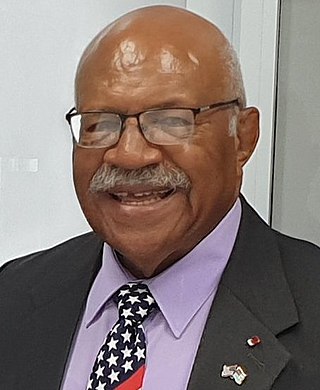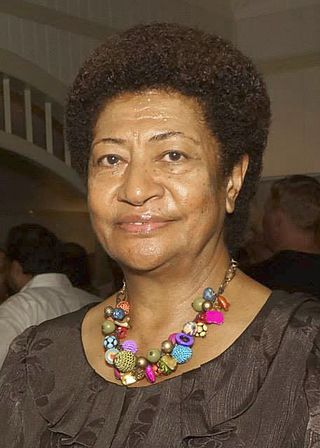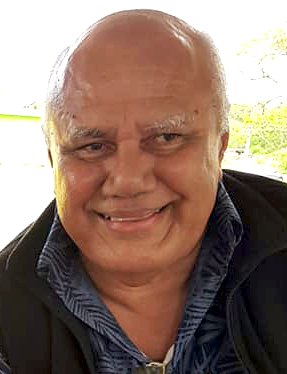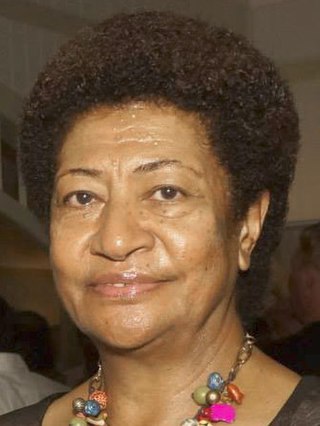The 1997 Constitution of Fiji was the supreme law of Fiji from its adoption in 1997 until 2009 when President Josefa Iloilo purported to abrogate it. It was also suspended for a period following the 2000 coup d'état led by George Speight.

Sitiveni Ligamamada Rabuka is a Fijian politician who has served as Prime Minister of Fiji since 24 December 2022. He was the instigator of two military coups in 1987. He was democratically elected as Prime Minister of Fiji, serving from 1992 to 1999, and again in 2022, leading a three-party coalition. He also served as Chairman of the Great Council of Chiefs from 1999 to 2001, and later as Chairman of the Cakaudrove Provincial Council from 2001 to 2008.

In Fiji, the Leader of the Opposition is a senior politician who commands the support of the Official Opposition. The Leader of the Opposition is, by convention, the leader of the largest political party in the Parliament of Fiji that is not in government. This is usually this is the parliamentary leader of the second-largest caucus in Parliament. It did not originate in Fiji but has a long tradition; in British constitutional theory, the Leader of the Opposition must pose a formal alternative to the government, ready to form a government himself should the Prime Minister lose the confidence of the parliament.

Ro Teimumu Vuikaba Kepa is a Fijian chief, former Member of the Parliament of Fiji, and former leader of the Social Democratic Liberal Party. She was the first Fijian woman to serve as Leader of the Opposition. She previously held the position of deputy Prime Minister in the Qarase-led Soqosoqo Duavata ni Lewenivanua (SDL) government from 2001 to 2006. As the paramount chief of the Burebasaga Confederacy, she holds the title Roko Tui Dreketi.

The Fijian coup d'état of December 2006 was a coup d'état in Fiji carried out by Commodore Frank Bainimarama, Commander of the Republic of Fiji Military Forces (RFMF), against Prime Minister Laisenia Qarase and President Josefa Iloilo. It was the culmination of a political crisis that started the previous year, when the Qarase government introduced three bills to the Fijian Parliament. The Qoliqoli, Land Tribunal, and Reconciliation, Tolerance, and Unity Bills dealt with the ongoing ethnic conflicts in Fiji and the aftermath of the 2000 coup, and were considered to be pro-ethnic Fijian. Bainimarama presented the government with a list of demands on October 16 that included withdrawing the bills. Attempts at negotiation failed and the military launched the coup on 4 December. Parliament was dissolved, Qarase and his cabinet were dismissed, and some civilian officials were placed under house arrest. After the Great Council of Chiefs refused to appoint a cabinet friendly to the military, Bainimarama reached an understanding with Iloilo and reinstated him as President on 4 January 2007. Iloilo then appointed Bainimarama acting Prime Minister in charge of the Interim Cabinet.

Aiyaz Sayed-Khaiyum is an Fijian politician and a former cabinet minister. He was the Fijian attorney general and the Minister for Economy, Civil Service and Communications, and also served as the minister responsible for climate change under the FijiFirst government. He is the third-highest polling candidate from the Fijian general elections of 2014 and 2018.
Roko Tupou Takaiwai Senirewa Draunidalo is a Fijian lawyer and politician. She is a former member of the Parliament of Fiji and from 2018 to 2022 was the president of the HOPE party.

The Social Democratic Liberal Party (SODELPA) is a Fijian political party. The party was formed in January 2013 after the dissolution of the Soqosoqo Duavata ni Lewenivanua. The party currently has no party leader.

Biman Prasad is a Fijian politician and economist who has served as the leader of the National Federation Party since 2014, and Deputy Prime Minister and Minister of Finance since 2022.

Lt Col Pio Tikoduadua is a Fijian politician, cabinet Minister and Member of the Parliament of Fiji. He is the current President of the National Federation Party.

Viliame "Bill" Rogoibulu Gavoka is a Fijian politician and Cabinet Minister. From 28 November 2020 to 2022 he was leader of the Social Democratic Liberal Party, after ousting Sitiveni Rabuka in the SODELPA leadership contest.

General elections were held in Fiji on 14 November 2018. The result was a victory for the ruling FijiFirst party of Prime Minister Frank Bainimarama, which received just over 50% of the vote and 27 of the 51 seats in Parliament, a loss of five seats. The main opposition party, Social Democratic Liberal Party, gained six seats, whilst the National Federation Party retained its three seats.

Lynda Diseru Tabuya is a Fijian politician and lawyer who has served as the Minister for Women, Children and Poverty Alleviation since 24 December 2022.

Ratu Wiliame Maivalili Katonivere is a Fijian chief and politician who is the president of Fiji since 2021. He has also been the chief of Macuata Province since 2013, succeeding his older brother Aisea Katonivere, and was previously involved in conservation initiatives of Fiji's Great Sea Reef.

Indirect presidential elections were held in Fiji on 22 October 2021, in which members of parliament elected the president.

General elections were held in Fiji on 14 December 2022 to elect the 55 members of Parliament. The elections took place following the passage of controversial electoral amendments.

The People's Alliance is a political party in Fiji. The party was formed in 2021 by Sitiveni Rabuka who served as Prime Minister of Fiji from 1992 to 1999 and again from December 2022.
Ro Filipe Qaraniqio Tuisawau is a Fijian chief, politician, and Cabinet Minister. He is a member of the People's Alliance. He is the son of former National Federation Party MP Ratu Mosese Tuisawau and the nephew of former SODELPA leader Ro Teimumu Kepa.
The Electoral Commission is an independent statutory body responsible for conducting elections in Fiji. It is also responsible for registering Fijian voters, political parties and candidates for elections.














